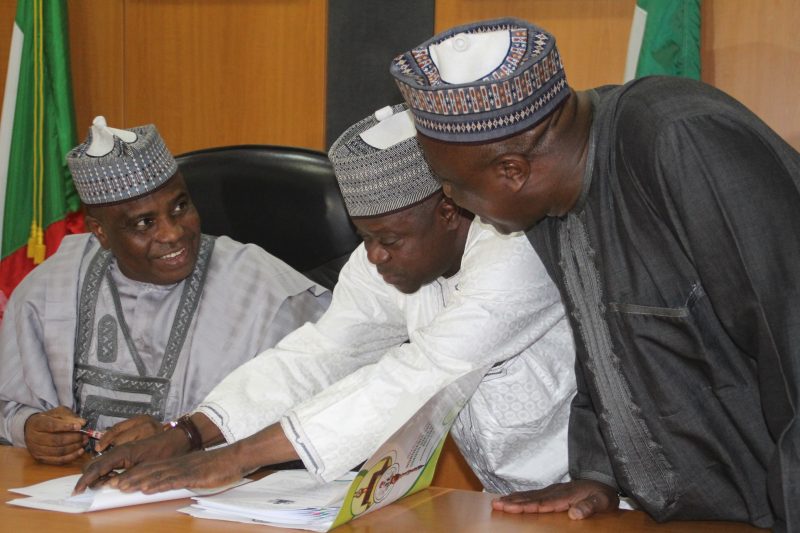Without doubt, the 2017 Appropriation Process has so far been without the several controversies that trailed the 2016 Process. This can be attributed to no less than the better rapport between the Presidency led by President Buhari and the National Assembly as led by Senate President Saraki. Even with the physical absence of President Muhammadu Buhari who is on medical vacation; the cordial relationship has been extended to Acting President Yemi Osinbajo towards ensuring the appropriation process is smooth all the way from its presentation to passage into law.
One major expectation when the 2017 Budget becomes law is for it to lead Nigeria out of recession; such that skyrocketing prices of goods and products crash and the exchange rate stabilizes. It has been identified that the most economically feasible way forward out of recession is through increased spending by Government. However, it will do us a lot of good as a nation if this increased spending is towards the purchase of goods, payment for procurements and contracts as well as provision of services done by our local Manufacturers and Industrialists.
The MDAs of the executive arm should as a matter of priority latch on to the different initiatives such as #MarketNigeria, #BuyNaijaToGrowTheNaira and #MadeInNigeria which have been envisioned and championed by members of the legislative arm and actually put government word into action. The executive both at the Federal and State levels should indeed take it as prerogative to engage local manufacturers in procurements of the many things to buy in the course of the 2017 Fiscal Year. From Police, Military and NYSC Uniforms/Kits to Computers and Softwares, Photocopiers, Clothes, Chairs, Tables, Printing Papers and even Toiletries should all be locally sourced.
In fact, the words of Senate President Bukola Saraki while opening the recent maiden three day public hearing on the 2017 budget pointed out the policy implementation direction which he expected the Federal Government to take at this crucial time. Dr. Saraki did not mince words in saying that “the 2017 capital budget proposal is intended to support activities that will help to speed up the diversification of the economy and the promotion of the non-oil sector, as well as create jobs for our youth. Accordingly, it is expected that “Made-in-Nigeria” (that is, domestic production of food, materials and other commodities) will be encouraged”.
The 8th National Assembly has also been able to galvanize unprecedented support across different strata of society through the involvement of the tax paying public in the 2017 appropriation process; an obvious improvement over the engagement of CSOs which was convened by Senate President Bukola Saraki during the 2016 Budget process. In normal climes, this involvement should even begin while the Budget Office prepares the medium term expenditure framework / fiscal strategy paper and the draft budget and the transparency on the budget which is actually a public document be further entrenched during the legislative process. For me personally as a Nigerian who is particularly interested in the workings of the legislature in our nascent democracy, the open mic forum which drew representatives from diverse labour unions, academics, civil society organizations as well as government officials is a trailblazer.
The Senate President, Dr. Abubakar Bukola Saraki after the presentation of the 2017 Appropriation Bill to the Joint Session of the National Assembly by President Muhammadu Buhari on Wednesday 14th December, 2016, had hinted that “when the current National Assembly introduced the Civil Society Public Hearing on the Budget initiative, the idea was to open up the budgeting space by incorporating the Civil Society into the budget process, thereby ensuring greater transparency and accountability. We are proud to say that this engagement has come to stay as a crucial part of our budget approval process”. This, he again reiterated while opening the three day public hearing on Monday 13th of February, 2017 that “through this engagement, and others to come, we hope to increase the efficiency of government and its responsiveness to citizens needs as well as improve overall transparency and accountability in governance”. This people participation in the appropriation process by the 8th National Assembly is change in the right direction.
The forum which afforded several organizations such as the Centre for Social Justice, Civil Society Legislative Advocacy Centre and BudgIT amongst others a platform to pinpoint suspicious, repeated, frivolous and needless estimates in the Budget also allowed others with vested interests such as the Nigerian Union of Pensioners, Action Aid, Wellbeing Africa, Millennium Agenda Nigeria, Development Agenda, Youth Initiative for Advocacy, Growth and Advancement and the Academic Unions of Research Institutions et al speak on areas of interest which they wanted the budget to focus on. The public hearing also gave different executive parastatals the ample opportunity to respond to the several misconceptions on the line items that make up government spending.
It is with high hopes that Nigerians believe that all of the Senate Committees which have been meeting with MDAs for their budget defense will extend oversight to ensure quality locally manufactured products are extensively patronized and that the Almighty Joint Appropriation Committee co – chaired both by Former Gombe State Governor and Senator representing Gombe Central, Danjuma Goje and Honourable Mustapha Bala Dawaki will heed the recommendations of the public hearings and ensure a thorough fine – tuning of the 2017 budget such that by the time it comes out from the legislative mining process, it will indeed lead Nigerians out of the current economic abyss we unfortunately find ourselves.

